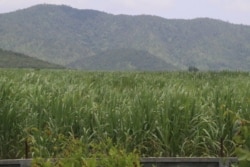International advocates and human rights groups said that while the monetary settlement offered to some Kampong Speu villagers by ANZ Bank last week was a welcome development, challenges remain for thousands of land disputants in light of continued government-private sector impunity.
The Australia and New Zealand Banking Group (ANZ Bank) last week announced it would pay Kampong Speu residents affected by rights abusing sugar plantations an undisclosed amount for a $40 million loan it gave to Phnom Penh Sugar, owned by senator and controversial tycoon Ly Yong Phat.
The Australian bank will pay at least 1,000 families the gross amount it received in interest from the controversial sugar firm, admitting that the loan violated the bank’s own internal human rights standards. At the time, the loan was disbursed through a local subsidiary called ANZ Royal Bank, which was a partnership with another controversial Cambodian tycoon, Kith Meng.
The settlement is being viewed as a landmark case of accountability in a country where the impunity enjoyed by Cambodia’s elites has seen little or no relief for land dispute communities.
Phil Robertson, deputy director for Asia at Human Rights Watch, said it was encouraging to see a bank “step up” and reflect on the consequences of its actions, even though it was unlikely local Cambodian firms, who were at the forefront of similar rights violations, would adopt a similar approach.
Additionally, Robertson said years of sustained advocacy and the concerted efforts of communities, local advocates and international groups were needed to put forth a strong case for the settlement.
“You know there is a lot of work that went into this campaign in order to finally get ANZ to recognize they did something wrong,” Robertson said. “You know it’s very difficult to say that a Chinese company or a Vietnamese company that seize land would do the same thing.”
Robertson pointed out that the nexus between the government, military and private sector was so deeply entrenched that it was unlikely they would ever admit the adverse implications of their actions.
“I mean these are companies where again you have military or government people from Cambodia involved and shady investment with these foreigners, taking advantage of the Cambodian people,” he said.
Cambodian rights group Licadho lists nearly 300 economic land concessions, covering around 2.1 million hectares, across the country that have been leased to private interests for agribusinesses, with little or no consultation with communities living on this land.
Many of these ELCs have engaged in forced, often violent, land evictions and other human rights violations in cooperation with local authorities, leaving thousands of Cambodian families to deal with unending land disputes.
“Eighty per cent of the total population in Cambodia is rural and land grabs are often carried out without consultation or compensation,” said Ali Hines, land campaigner at U.K.-based rights group Global Witness.
The Kampong Speu agreement came five years after two nonprofits filed a complaint against the bank with a little-known entity within Australia’s treasury department, the nonjudicial Australian National Contact Point (ANCP), which assesses corporate behavior vis-à-vis guidelines set forth by the Organization for Economic Cooperation and Development (OECD).
Despite the large number of land disputes in Cambodia, Hines said the decision was critical and held wider implications for the investor community, especially for the actions of companies they choose to invest in.
“This case is an important reminder that investors can no longer be blind to the environmental and human rights abuses carried out by the companies they invest in,” she said.
The Kampong Speu sugar plantations have routinely been criticized for persistent land rights violations, with even ANZ internal audits showing shortcomings in its protection of human rights and environmental obligations while funding the project, which had long been plagued with accusations of child labor and forced evictions.
The European Union, which was a major export destination for Cambodian sugar, partially revoked trade privileges for Cambodia last month on account of systemic human rights violations in the country. One of the areas investigated by the EU Commission was land disputes arising from the sugar sector.
In its conclusions on February 12, the commission pointed out that some progress had been made on addressing the dispute but that there were “shortcomings” in addressing land titling and registration, as well as addressing rights abuses against indigenous communities. As a result, the commission imposed full tariffs on sugar exports to the EU, even though sugar exports to the economic bloc have been near-zero for the last five years.
Ear Sophal, associate professor of diplomacy and world affairs at Occidental College in California, United States, said that despite the EU’s admonition, it needed to directly target individuals and companies involved in land grabs and sanction them.
“The EU's targeted sanctions on land grabbers will have an impact. It must punish those who have wronged the people of Cambodia,” he said.
Sophal Ear, who authored a book titled “Aid Dependence in Cambodia: How Foreign Assistance Undermines Democracy,” said while there was little direct impact of the EU’s decision to partially suspend the “Everything But Arms” (EBA) trade privileges, the ANZ announcement could reverberate on the ground.
“Indeed, it seems to me that while everyone bemoans the lack of impact on the Cambodian government in terms of EBA suspension, and how Phnom Penh has no daylight between itself and Beijing, there will be an impact on situations like sugar, land, and other abuses on the ground,” he said.
VOA Khmer attempted to reach Senator Ly Yong Phat and Phnom Penh Sugar multiple times last week but received no response.










